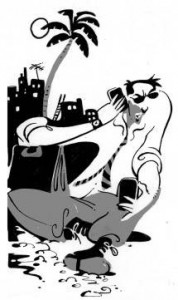Veteran Canadian diplomat Daryl Copeland has been on the ramparts of diplomatic studies for several years now, advocating a kind of diplomacy he calls Guerrilla Diplomacy. Last week, at the International Studies Association convention in New Orleans, a panel of expert academics reviewed Copeland’s thesis and generally applauded his ideas.
I also had a chance to sit down with Daryl and you can download and listen to our interview here.
Essentially, Copeland in his book and writings is advocating a kind of public diplomacy — less formal, less bureaucratic, more flexible. In Copeland’s view, a public diplomat may be a government official, but doesn’t  necessarily come from a foreign ministry. He or she clearly represents a state, but is dispatched to communicate with non-diplomats. Copeland, for instance, feels that Canada’s diplomacy should have taken more advantage of Canada’s large Haitian community in Montreal as a resource for understanding how to deliver aid following the recent earthquake. He also likes the way that a Canadian fisheries minister in the mid-Nineties staged a Greenpeace-like demonstration for media on the East River of New York City, showing how a Spanish fishing trawler that the Canadians had seized on the high seas had been netting internationally protected fish.
necessarily come from a foreign ministry. He or she clearly represents a state, but is dispatched to communicate with non-diplomats. Copeland, for instance, feels that Canada’s diplomacy should have taken more advantage of Canada’s large Haitian community in Montreal as a resource for understanding how to deliver aid following the recent earthquake. He also likes the way that a Canadian fisheries minister in the mid-Nineties staged a Greenpeace-like demonstration for media on the East River of New York City, showing how a Spanish fishing trawler that the Canadians had seized on the high seas had been netting internationally protected fish.
Whether such activity is really guerrilla-like can be questioned. Copeland is mainly looking for a way toward “radical reform” of diplomacy that will resolve its “crisis of relevance and effectiveness.” Perhaps, he muses, the sorts of skills that one develops in “independent world travel — survival skills, resilience, cross cultural communication skills, problem solving skills” — are the ones that foreign ministries of our flat world should encourage. Such skills should, in any event, help diplomats keep their bearings, regardless of how they view and pursue their work.
Copeland’s message is a timely one for the United States. Not only are U.S. diplomats increasingly asked to take on non-traditional roles in conflict zones, the State Department is in the final stages of its in-depth review of its practices and strategy, known as the Quadrennial Diplomacy and Development Review. If traditional definitions of diplomacy are ever to be amended, now would seem to be a good time to make the effort.